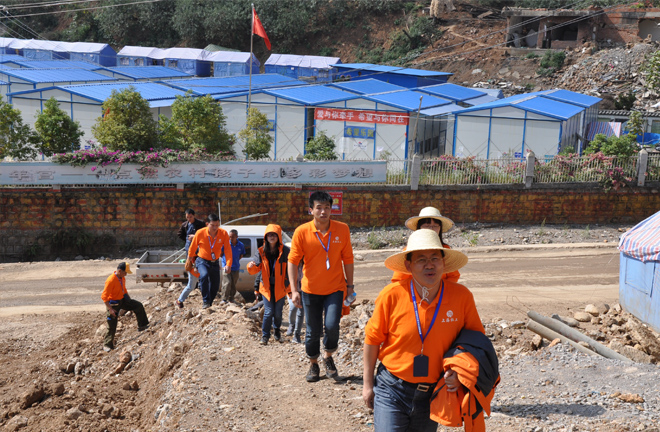2015 to be year of innovation in philosophy, social sciences

Wen Jun and his research team offer post-disaster social support to the victims in the Ludian earthquake area in Yunnan Province.
As 2014 came to an end, members of China’s philosophy and social sciences circles expressed optimism for prospects in the coming year. In this new year, what issues will they pay attention to, and what kind of academic research will they conduct?
Theoretical research based on practice
In order to learn about the latest trends in academia and detail the efforts of Chinese scholars to explore today’s most pressing theoretical and practical problems, China Social Sciences Today contacted professor Wen Jun from the School of Social Development at East China Normal University in Shanghai, who had just returned from the site of the Ludian earthquake in Yunnan Province.
“Our team’s mission is to enhance victims’ self-help and mutual assistance capabilities and to rebuild the post-disaster social support system by utilizing professional methods and techniques, as well as exploring new approaches to conducting post-disaster emergency social work,” he said.
“Since September 2014, we have already conducted large amounts of field research at earthquake-stricken areas, collecting lots of primary data. In 2015, we will further improve the country’s emergency relief system by combining the current research situation of social work theories at home and abroad and China’s practice of social work,” said Wen.
Like Wen, Ding Shijun, dean of the School of Public Administration at Zhongnan University of Economics and Law in Wuhan, Hubei Province, has also shifted his focus to grass-roots practice.
“I will conduct my research revolving around famers’ livelihood reconstruction in the context of changing of land use,” said Ding, adding that his research team has conducted field research of 900 household peasants in Jiujiang of Jiangxi Province, Xiangyang of Hubei Province and Kunming of Yunnan Province.
Fu Ping, a professor at the College of Sociology at Central China Normal University in Wuhan, Hubei Province, said he plans to analyze the crises facing Chinese enterprises in the context of economic globalization in 2015. In addition, Fu also said that he will try to clarify some issues related to the relationship between culture and market, exploring the influence of culture on market practice and its role in coordinating economic activities.
New academic growth points
“The studies of basin anthropology will become one of the new academic growth points for the development of anthropology and ethnology in China,” said Tian Qian, dean of the School of History and Culture at Southwest University in Chongqing.
Tian discussed the achievements attained by his research team in studying regional ethnic relations that took one basin as a unit when examining intangible cultural heritage protection.
“On this basis, we will pursue a more advanced methodology and plan to hold the first session of workshops on basin anthropology in China to build the talent pool for conducting the collaborative innovation of basin anthropology in the future,” he added.
This year, Hong Xiuping from the Department of Philosophy at Nanjing University will also finish a key project of philosophy and social sciences titled “Education Collection of 100 Buddhist Studies,” which is sponsored by the Ministry of Education. A series of books on Buddhist studies will be published. Hong will continue research on the relationship between Buddhist studies and social revolution while exploring the utilization of new materials and methods to provide a reference for current academic innovation.
Li Huarui from the School of History at Capital Normal University in Beijing will focus on the Chinese philosopher Mencius (372-289 BC) and society in the Song Dynasty (960-1279), probing how literati and officialdom rebuilt the social order based on Mencius’s ideas and the practice of Mencius’s benevolent government theory in the Song Dynasty.
“The studies of history of the Song Dynasty will represent a series of new research directions, including the nation and society, political culture as well as extension and new interpretations of literature of the Song Dynasty,” he added.
Philosophy and social sciences undertake the historical mission of promoting the construction of socialism with Chinese characteristics and realizing the rejuvenation of the Chinese nation, said Wang Zongli, a professor at the School of Marxism at Northwest Normal University in Lanzhou, Gansu Province, adding that he will conduct research on the new missions of philosophy and social sciences during the process of the great rejuvenation of the Chinese nation in 2015.
In addition, a large number of projects were also approved in 2014 that demonstrate the mission of philosophy and social sciences to serve the nation and its people. For example, major projects sponsored by the National Social Sciences Fund will mainly explore the great theories of the Communist Party of China, Chinese traditional culture and the significant theoretical and practical issues related to national and social development.
